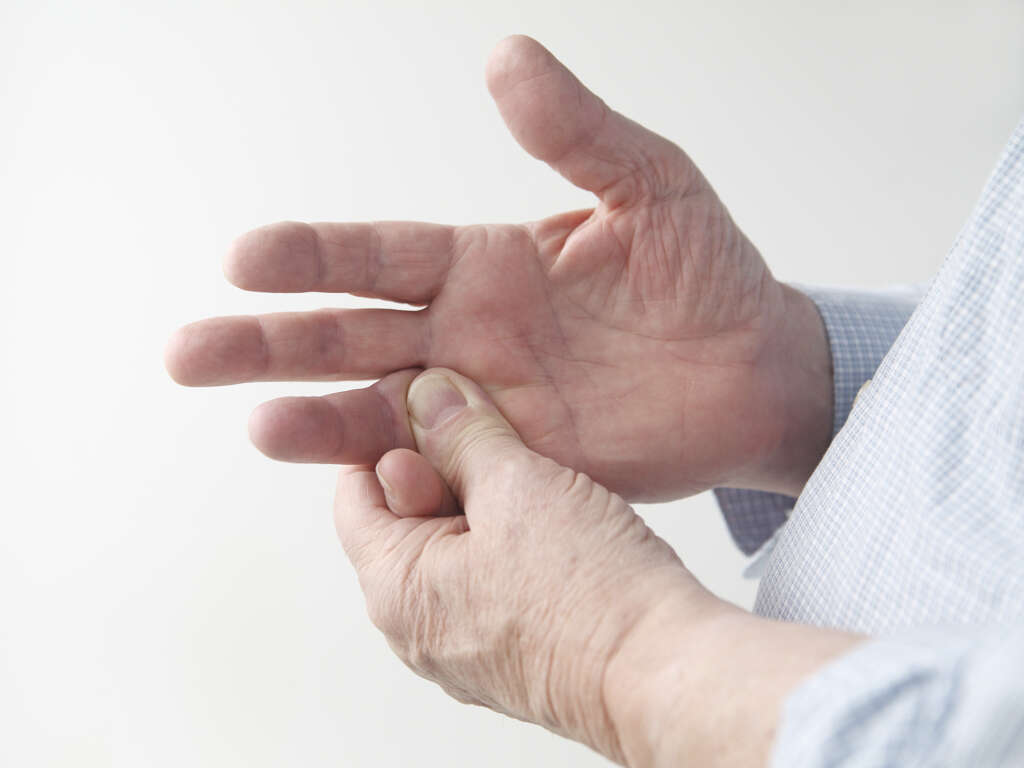10 Numb Fingers Symptoms
 Article Sources
Article Sources
- 1. 'Pinched Nerve.' Mayo Clinic, Mayo Foundation for Medical Education and Research, 26 Sept. 2019, www.mayoclinic.org/diseases-conditions/pinched-nerve/symptoms-causes/syc-20354746
- 2. 'Raynaud's Phenomenon.' Versus Arthritis, www.versusarthritis.org/about-arthritis/conditions/raynauds-phenomenon/
- 3. 'Rheumatoid Arthritis: Causes, Symptoms, Treatments,' www.arthritis.org/diseases/rheumatoid-arthritis
Irritation, damage and compression to one of the nerves as well as diseases, such as diabetes, are just a few of the causes of numb fingers.1‘Pinched Nerve.’ Mayo Clinic, Mayo Foundation for Medical Education and Research, 26 Sept. 2019, www.mayoclinic.org/diseases-conditions/pinched-nerve/symptoms-causes/syc-20354746 Other causes may include brain or spinal cord problems, although arm or hand weakness and loss of function are also apparent in these instances.
The various causes, including carpal tunnel syndrome and ulnar nerve entrapment, are accompanied by a multitude of symptoms. Numb finger symptoms range from a loss of sense of touch and pain that travels up the arm to more complex symptoms, such as a loss of mobility as a result of a ganglion cyst.
Pain That Travels Up the Arm
The numbness in the fingers is sometimes accompanied by pain that travels up from the fingers to the arm. Along with the pain, a person may experience a burning sensation in the arm. This is a common symptom when the cause of the numbness is a condition such as ulnar nerve entrapment or carpal tunnel syndrome.
Arm pain may be the result of repetitive motion. Doing the same movement repeatedly puts a lot of pressure on the muscles, ligaments and tendons in the arm or hand. This may lead to tendonitis, or inflammation in the tendons, resulting in pain and discomfort.
Decreased or Loss of Sense of Touch
When a person's fingers are numb, they may lose their sense of touch, but they may also lose their sense of pain in the affected area. This may cause the individual to injure themselves without realizing it.
Hypoesthesia, as it is medically known, is a partial loss of sensation in a part of the body. Anesthesia is the total loss of sensation. In addition to losing the sensation of pain and touch, the person may also lose their ability to sense temperature.

Loss of Reflexes
Another symptom of numb fingers is loss of reflexes. This is especially the case when peripheral neuropathy or certain brain conditions cause finger numbness. This disorder occurs when nerve damage interferes with the peripheral nervous system.
When a person loses their reflexes, everyday tasks may become increasingly difficult. Driving, holding objects or even walking may take a monumental effort. Loss of reflexes may develop due to damage to motor neurons, a type of brain cell in the spinal cord and brain.
Discoloration of Fingers
The numbness in a person's fingers may be due to Raynaud's phenomenon. The condition may develop when blood flow to the fingers is restricted or interrupted. This may cause numbness and discoloration.2‘Raynaud’s Phenomenon.’ Versus Arthritis, www.versusarthritis.org/about-arthritis/conditions/raynauds-phenomenon/
Those affected may notice their fingers turning white when exposed to cold. They're likely to lose all sensation in the area, and the skin sometimes takes on a blue tinge. The color returns to normal upon warming. This is a result of spasms in the blood vessels carrying blood to the extremities.

Swollen Joints
Joints are found in numerous parts of the body, including the arms, legs, hips, knees, feet and ankles. They sometimes become swollen, causing pain and discomfort. Swelling typically occurs when fluid accumulates in the soft tissues that cushion the joints.
The swelling may result from a chronic condition, such as rheumatoid arthritis, or injury, such as a dislocation.3‘Rheumatoid Arthritis: Causes, Symptoms, Treatments,’ www.arthritis.org/diseases/rheumatoid-arthritis Swelling may also be associated with numb fingers. In addition, the joints may become stiff and appear larger than normal.
Pins and Needles
That uncomfortable tingling and prickling sensation a person feels when they wake up after lying on their arm all night is due to nerve compression. The feeling typically fades fairly quickly once the pressure has been removed.
These occasional bouts of pins and needles are normally nothing to worry about. However, persistent pins and needles may indicate a more serious condition or injury. Medical attention should be sought immediately if the tingling is accompanied by other symptoms, such as slurred speech or vision problems.

Loss of Mobility
Loss of mobility of the affected finger can also develop. For example, this may be the case if the numbness is due to a ganglion cyst. If the cyst is located on the foot, ankle or near a nerve, walking may be difficult.
When a person experiences a loss of mobility, they're unable to move around freely without pain. Loss of mobility is commonly due to old age or injury.
Fever
Fever may be associated with numb fingers, especially when it's caused by less common conditions, such as HIV or Lyme disease. Although normal body temperature is typically 98.6 degrees Fahrenheit, it varies slightly from person to person.
A temperature taken orally is considered a fever at 100 degrees Fahrenheit or above. Body temperature may fluctuate depending on the time of day. For instance, lower temperatures are more common in the morning, while late afternoon and evening typically result in higher readings.

Depression
Depression may interfere with every aspect of a person's life. Sadness, anger and feeling bad about themselves are just some of the emotions an individual may experience while going through depression.
Depression may be associated with numb fingers if the underlying condition is a chronic problem like multiple sclerosis or fibromyalgia. Feeling down and despondent now and then is part of daily life. However, a person who feels sad, unhappy and miserable on a regular basis may be going through a period of depression.
Paralysis
Numbness is loss of sensation, where paralysis is loss of sensation and movement. A person with paralysis has no muscle strength or control over a muscle group. It may be particularly evident when the numbness in the fingers is due to a stroke.
The loss of muscle function may be temporary or permanent, and it's unlikely an individual feels pain in the affected area. Tingling or numbing sensation may develop before total paralysis develops.










